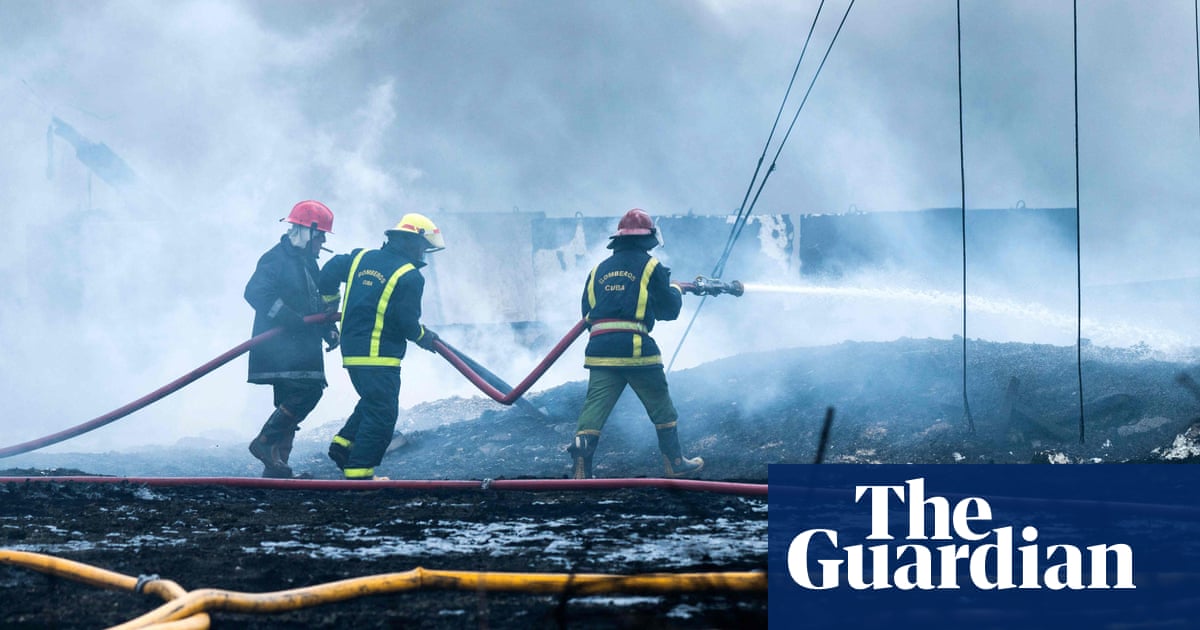
A lightning strike, a chain of fireball explosions so huge they could be seen 65 miles away in Havana, and a lingering stench of sulphur.
The five-day blaze at Cuba’s main oil storage facility in Matanzas was sparked by lightning on Friday night. Over the following days, the flames spread “like an Olympic torch” to three more tanks containing hundreds of thousands of cubic feet of fuel, according to the region’s governor, Mario Sabines.
Only on Tuesday was the conflagration finally brought under control. By then, it had killed at least one person and injured 125 others, and dealt a critical blow to Cuba’s energy infrastructure.
And as the smoke clears, speculation is mounting that it – and the blackouts that will inevitably follow – could further destabilise the “Cuban Revolution”, already at one of the most perilous moments in its 63-year history.
Millions of Cubans – especially those in the rural provinces – have for months been living with daily power cuts that last hours. In the August heat, food rots quickly and sleep becomes all but impossible.
The situation is tense: the immediate trigger for last summer’s unprecedented protests was a 12-hour power outage.
In Matanzas, Odalys Medina Peña, 60, said she had long grown used to cooking breakfast, lunch and dinner at the crack of dawn in anticipation of blackouts.
“You’ve got to adapt and see whether the country can resolve the situation. When something like this happens, everyone comes together – because if Cuba has one thing, it’s humanity.”
But with toxic smog blotting out much sunlight in Havana over the weekend, the feeling in the capital was less stoic.
A resident sits on a sea wall as smoke rises in the background from the fire. Photograph: Ismael Francisco/AP
“I’m frightened of this horrible cloud and I’m worried about power cuts,” said Adilen Sardinas, 29, who is eight months pregnant. “How is the state going to handle this?”
Officials have not said how much crude, diesel and fuel oil has been lost in the fire, but Cubans are already bracing for an even more severe energy crisis.
Oil shipments from Venezuela have dwindled as Cuba’s South American ally struggles to refine enough oil for its own needs. The surge in global oil prices caused by the war in Ukraine has also made it harder for Cuba to buy it on the global market.
But analysts say the one-two punch of Covid, which all but shuttered tourism in 2020 and 2021, and US sanctions has been decisive.
Cuba’s “foreign exchange inflows almost halved between 2018 and 2021”, said Emily Morris, a development economist at University College London. “Despite reducing fuel and food supplies to an essential minimum, in 2021 they accounted for more than half of all import spending, with more severe cuts in all other imports, including spare parts, production inputs, capital equipment and consumer goods, so you can see what a devastating effect that was going to have.”
Despite Joe Biden’s campaign promise to reverse the “Trump policies that inflicted harm on Cubans and their families”, the bulk of the Trump administration’s “maximum pressure” campaign against the island remains.
Tankers carrying Venezuelan oil to Cuba still face sanctions. Analysts say this forces the island to pay a premium on freight.
While Venezuela and Mexico sent specialist teams and more than one hundred tonnes of fire extinguishing foam, the U.S. offered technical assistance. “So far the US has offered a phone number to an emergency local authority,” Johana Tablada, the deputy director for U.S. affairs at the Cuban Foreign Ministry, wrote on Twitter.
Fulton Armstrong, who was the US intelligence community’s most senior analyst on Latin America, said there are “fears among supporters of a return to the normalization process launched by President Obama that the [Biden] administration is … privately hopeful that the energy and other problems are a test that ‘the regime’ fails”.
Jorge Piñon, director of the University of Texas at Austin’s Latin America and Caribbean energy and environment Program, said that even before the blaze, his modelling had predicted a “total collapse” of the island’s energy grid this summer.
He also noted that a Russian tanker carrying 115,000 tonnes of petroleum was due to dock in the port of Matanzas later this week. “Where is she going to go?”
{{topLeft}} {{bottomLeft}} {{topRight}} {{bottomRight}} {{/goalExceededMarkerPercentage}} {{#goalExceededMarkerPercentage}}{{/goalExceededMarkerPercentage}} {{heading}} {{#paragraphs}} {{#ticker}}{{/ticker}}{{#paragraphs}} {{.}} {{/paragraphs}} {{highlightedText}}
{{#choiceCards}}
Single Monthly Annual
Other {{#cta}} {{text}} {{/cta}} Email address Please enter a valid email address Please enter your email address Set a reminder Sorry we couldn’t set a reminder for you this time. Please try again later. . To find out what personal data we collect and how we use it, view our We will send you a maximum of two emails in. To find out what personal data we collect and how we use it, view our Privacy Policy . If you have any questions about contributing, please We will be in touch to remind you to contribute. Look out for a message in your inbox in. If you have any questions about contributing, please contact us {{/paragraphs}}{{#choiceCards}}{{/choiceCards}}








